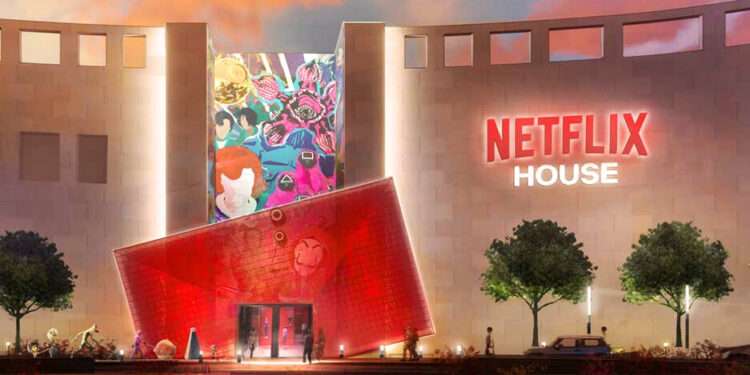Netflix House: The Streaming Giant’s Bold Move to Rival Disney’s Theme Park Empire
The streaming entertainment platform Netflix announced its expansion into physical experiences that go beyond screen entertainment.
Netflix launched a revolutionary change in its operations by deciding to build theme park facilities titled Netflix House which will begin operations on August 1st 2025.
Through this strategic move Netflix enters physical entertainment territory in its most extensive manner while directly competing with Disney’s theme park business.
The Vision Behind Netflix House
The main goal of Netflix House is to merge its famous content with real-time interactive encounters. The initiative will provide elaborate theme park elements together with interactive exhibits as well as dining areas and performances which draw inspiration from Netflix originals including Stranger Things, Squid Game, Bridgerton, The Witcher and Money Heist.
Visitors will experience the spooky Upside Down area while participating in Squid Game-style challenges that are safe and experiencing a Bridgerton-style royal ball during the Regency period. The company plans to connect fiction and reality by developing unique interactive experiences based on Netflix content.
This business initiative reaches further than entertainment does. This is not simply an amusement project because it represents a strategic business initiative. Netflix enters the location-based entertainment market to establish new revenue channels while preserving customer devotion because streaming competition continues to rise. The streaming industry faces saturation while subscriber numbers decrease so companies need new ways to engage customers.
Chief Marketing Officer Marian Lee declared: “At Netflix House fans will experience the convergence of stories with actual events.” Our fans seek more than content since they desire experiences and we plan to provide them.
What Will Netflix House Look Like?
The company has not released any official design blueprints but concept images depict vibrant structures with futuristic architecture and content zones. The facility will have themed cafes and escape rooms and merchandise shops along with augmented reality areas and live performances that recreate Netflix fan favorite scenes.
Expected Features:
- Stranger Things Haunted Maze
- Squid Game Obstacle Arenas (no elimination!)
- The Bridgerton Ballroom Experience
- Money Heist Live Theater
- The Witcher Sword Training Grounds
- Black Mirror Tech Lab
Each zone has been designed to create visually appealing environments that will attract Instagram and TikTok users while delivering cultural immersion to their audience.
Where and When?
The initial two Netflix House venues will begin operations in Los Angeles and Seoul during the last months of 2026. The two cities were chosen because they host large fan communities together with lively tourism activities and hold cultural significance for Netflix programming.
The western-themed opening event in Los Angeles will integrate strong ties with Hollywood entertainment.
Seoul will exhibit Squid Game and All of Us Are Dead through local content during its K-drama boom period.
The company plans to expand its locations in London, Tokyo, and São Paulo starting in 2027.
The Disney Comparison: Can Netflix Compete?
The company has publicly stated its intention to become the next major player after Disney. But can it?
Disney generates $30 billion each year from its theme parks through its established legacy of IP along with family-oriented content and enduring multigenerational fan loyalty. The company holds an abundance of content but fails to match the established legacy and distinctive character-based brand value of Disney.
Netflix uses its cultural significance along with adult-oriented activities and worldwide fan networks to develop unique market competitiveness. The Disney theme park sector mainly serves families with children whereas Netflix House will focus on providing entertainment for Gen Z members and Millennial fans and specialized fandom groups.
Revenue Potential & Market Impact
Morgan Stanley analysts predict Netflix will reach $3–5 billion in annual revenue through location-based entertainment operations when the company implements its strategy correctly. That’s considering:
- Admission fees
- Branded merchandise
- Food & beverage sales
- Exclusive memberships and events
- Sponsorships and brand collaborations
This expansion strategy presents itself as an essential component for Netflix to achieve future financial success as streaming revenue becomes stagnant.
Stock Market Reaction…The shares of Netflix (NFLX) increased 3.7% following the announcement which indicated investors were optimistic about the company’s move into real-world operations. The market analysts predict that the success of Netflix House will drive the company to start new business ventures in the fields of gaming arcades and cruise experiences as well as AI-driven story rooms.
Challenges Ahead
Despite the buzz, Netflix faces serious hurdles:
- The first challenge is the high costs of building and obtaining licenses for the theme park.
- Safety & legal regulations
- Creative content burnout
- The established theme park giants Universal Studios and Disney are among the strong competitors of the market.
Some critics believe Netflix should direct its resources towards enhancing its streaming content instead of dividing them among different business ventures.
A Global Cultural Play
The reason why Netflix’s strategy stands out from other companies is its global-first approach to business. The company intends to create theme park attractions that will match the preferences of viewers from diverse cultural backgrounds. For instance:
- India: Sets inspired by Sacred Games
- Spain: Money Heist bank escape
- Germany: Dark time-travel maze
- Brazil: Sintonia street theater
The localization approach adopted by Netflix will provide the company with a worldwide competitive advantage that Disney cannot easily match.
Final Thoughts
The Netflix House project is more than a theme park because it represents a strategic move by the digital streaming giant to establish itself as a real-world entertainment company. The project will become the next Disneyland or fail due to poor execution combined with adverse timing and negative fan reception.
Netflix competes for customers’ lifetime commitment beyond screen time dominance.

